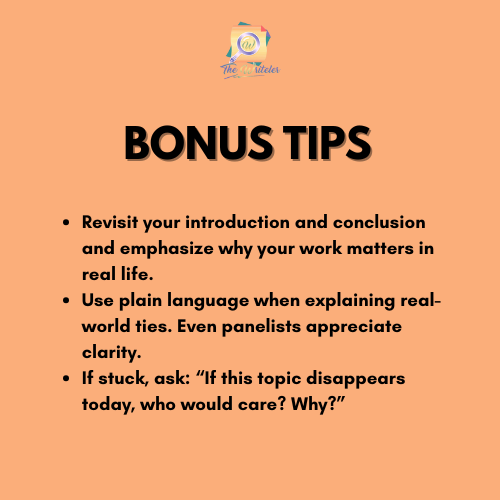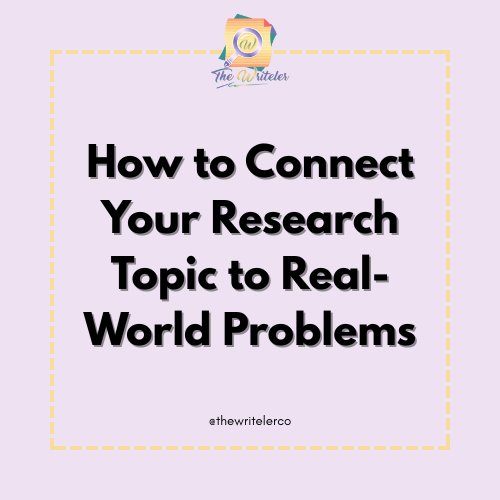Have you ever read a research paper and thought, “Okay… but why does this matter?” You’re not alone.
Many students and researchers fall into the trap of writing technically sound papers that, while impressive on paper, don’t feel connected to anything real. And when your paper lacks that bridge to real-life problems, your readers—whether professors, panelists, or the general public—might lose interest quickly.
In this blog, we’ll walk you through how to make your topic feel relevant and impactful by connecting it to real-world problems. Whether you’re in undergrad, taking your master’s, or pushing through a Ph.D., this is a skill that separates okay research from meaningful work.
Research and Real-World Connection Matters
Academic work is not just about hitting word counts or impressing panelists with jargon. The true power of research lies in its impact—its potential to solve, inform, or inspire action in the real world.
Here’s why connecting your topic to real-life issues matters:
- It makes your research more credible and powerful. Real-world application shows your work isn’t just theoretical.
- It sparks interest. If readers see how your work relates to their lives, industries, or communities, they care more.
- It boosts opportunities. Research tied to societal concerns is more likely to get funded, published, or supported.
Step-by-Step Guide to Connecting Your Topic
Let’s break it down.
1. Identify the Research Core Issue
Start by asking: “What is the heart of my research?”
Strip away the technical terms and get to the root. For example:
- A study on machine learning algorithms might be about improving health diagnostics.
- A thesis on ancient literature might uncover long-standing gender stereotypes that persist today.
2. Explore the Broader Context
Once you find the core issue, expand your lens.
- Are there current events related to it?
- Are there social or economic debates about it?
- Is it something that affects your country, city, or industry?
Let’s say your topic is food insecurity. Search for recent news articles about hunger in rural areas or pandemic-related supply chain issues. Use these to build your case.
3. Find Affected Stakeholders
Who benefits if your topic is addressed? Who suffers if it isn’t?
Your audience needs to see people in your work—not just theories or concepts. Stakeholders may include:
- Local communities
- Policymakers
- Small business owners
- Marginalized groups
- Industry professionals
If your study helps reduce traffic congestion in Metro Manila, then your stakeholders could include commuters, urban planners, and the LGUs.
4. Relate Your Research Objectives to Real Outcomes
Don’t just state what your research will do academically. Tell the reader:
- What change will it create?
- What solutions does it offer?
- What understanding does it deepen?
For example:
“This study aims to develop a waste management strategy using composting.”
Becomes:
“This study offers a cost-effective and low-tech waste solution for overcrowded barangays with poor sanitation systems.”
5. Support with Real Evidence
Bring your paper down to Earth.
Use:
- Government data
- Case studies
- News reports
- Interviews
- First-hand observations
This grounds your topic in truth and gives it weight.
Examples from Different Fields
- STEM: Research on solar panels can link to energy access in remote Philippine provinces.
- Social Sciences: A thesis on mental health can relate to rising suicide rates in students during the pandemic.
- Business: A market study on e-commerce can reflect the changing buying behavior of Filipino consumers post-lockdown.
- Humanities: An analysis of Filipino folklore may reveal how colonial narratives still shape identity today.
Common Mistakes to Avoid
- Staying too abstract: If your research only lives in theory, it becomes easy to ignore.
- Forced connections: Don’t add real-world issues just to check a box. Make sure they’re authentic.
- Ignoring the “So what?”: Always answer this question. If your research doesn’t matter to anyone outside the academe, revise your angle.

Conclusion
Your research isn’t just a requirement—it’s a voice. When you connect your topic to the real world, it becomes a bridgebetween knowledge and impact.
The best papers don’t just add to a library shelf. They change minds, solve problems, and start conversations.
Need Help?
The Writeler Co. is here to support students and professionals who are juggling research with work, life, and business. Whether you’re writing a thesis, capstone, or dissertation for your master’s or Ph.D., we help you efficiently navigate the research journey — from brainstorming to proofreading.
📩 Message us today to get started.
📚 Let’s turn your research idea into a powerful paper.





0 Comments